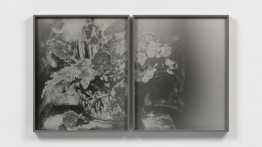Lisa Oppenheim Wolf Chair in Photography Artist Talk
Wednesday, March 29, 2023, 6:30 - 8pm

Blumenstilleben, N.D./2022 (Version I).” 2022. Two silver gelatin photographs exposed to firelight. 61 x 50.8 x 3.8 cm (framed). © Courtesy of Artist and Tanya Bonakdar Gallery, 2022
Lisa Oppenheim, 2023 spring Wolf Chair in Photography, gives an artist's talk about her work. Oppenheim is recognized for working with photography but is not strictly limited to it. She also draws upon the resources of libraries, collections, and online repositories as a point of departure for work that is layered and at times starkly abstract. Last fall she had a solo show Spolia at Tanya Bonakdar Gallery in New York. Her work will be included in the upcoming traveling exhibition Woven Histories: Textiles and Modern Abstraction, curated by Lynne Cooke in 2023-2024.
Certain through-lines visible in Lisa Oppenheim’s work suggest the many ways the history of photography can be a lineage of impossibly wide potential for an artist whose practice is inseparable from her research. Reaching back into documentary archives, for example, Oppenheim examines the overlooked outtakes of great photographers that were, for whatever reason, excised from the historical record, resurrecting them in her imagery. These missing links and obscure finds have technical corollaries in her work as well. Her images often focus on fragments and play with exposures to suggest the nuances of what is seen and unseen, revealed and hidden by the mechanics of the camera and the chemistry of processing. In her multifaceted work, she can invoke photography’s most complex functions: the capacity to remain completely mute while seeming to describe the world in infinite detail.
Oppenheim was born in 1975 in New York City, where she currently lives and works. She received her BA from Brown University in 1998, and later and an MFA from the Milton Avery Graduate School for the Arts at Bard College in 2001. She also attended the Whitney Independent Study Program from 2002-2003 and the Rijksakademie van beeldedne kunsten in Amsterdam from 2004-2006. Oppenheim’s work has been the subject of solo exhibitions at Museum of Contemporary Art Denver (2017), Museum of Contemporary Art Cleveland (2016), FRAC Champagne-Ardenne (2015), Kunstverein in Hamburg (2014), and Grazer Kunstverein, (2014). In 2014, Oppenheim was the recipient the AIMIA|AGO Photography Prize from the Art Gallery of Ontario and the Shpilman International Photography Prize from the Israel Museum. Notable group exhibitions include Afterlives, The Jewish Museum, New York (2021); Off the Record, Solomon R. Guggenheim Museum, New York (2021); Light, Paper, Process: Reinventing Photography, The Getty Center, Los Angeles (2015); Photo-Poetics, Deutsche Bank Kunsthalle, Berlin and Guggenheim Museum, New York (2015); AIMIA|AGO Photography Prize Exhibition, Art Gallery of Ontario, Toronto (2014); and New Photography at The Museum of Modern Art (2013). Oppenheim's work is held in the permanent collections of The J. Paul Getty Museum, Los Angeles, Museum of Modern Art, New York, San Francisco Museum of Modern Art, San Francisco, the Solomon R. Guggenheim Museum, New York, the Santa Barbara Museum of Art, Santa Barbara, Centre Georges Pompidou, Paris, Carnegie Museum of Art, Pittsburgh, Israel Museum, Jerusalem, MIT List Visual Arts Center, Cambridge, The Jewish Museum, New York and the Stedelijk Museum Amsterdam, among others.
Visitors must show security proof of vaccination or a negative PCR test by a third party (not home test) within three days of their visit to campus or a negative rapid test result taken by a third party (not home test) on the day of the visit to campus.
Located in the Frederick P. Rose Auditorium, at 41 Cooper Square (on Third Avenue between 6th and 7th Streets)




